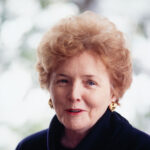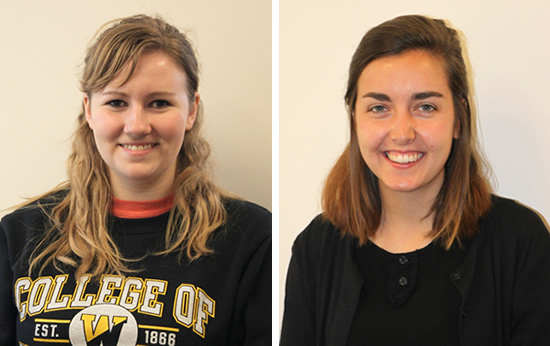
Wooster Students Shine Spotlight on Two Unsung Heroes
WOOSTER, Ohio – Someone you meet in college can change your life. It might be a roommate, or a mentor, a spiritual leader, or the guy who punched your lunch ticket every day. And every so often, it may be someone you met as the subject of your Independent Study project.

Abigail Helvering and Kristen Estabrook
Such was the case for two students this spring: history and religious studies major Kristen Estabrook and history major Abigail Helvering. Both discovered heroes that history had ignored.
Reverend James M. Lawson, Jr.
As Kristen Estabrook dug into the life and work of pacifist and civil rights activist Reverend James M. Lawson, Jr., she listened to speeches, read news reports, pored over interview transcripts, and studied lectures. When she finally began phone interviews with the 87-year-old Lawson, she described the experience as “amazing and surreal.” “He would say, ‘Now Kristen, listen closely. History got this bit wrong.’”
In her I.S. titled “The Scholar, the Teacher, the Saint: The Life Work, and Nonviolent Philosophy of Reverend James M. Lawson, Jr.,” Estabrook traces the history and influence of a man little known for his contributions. Lawson began living his convictions when he was in college in 1951, serving 13 months of imprisonment for resisting the draft for the Korean War. In Nashville, Tenn., he organized the Nashville Sit-In Movement to end racial segregation at lunch counters, work that resulted in his expulsion from the Vanderbilt Divinity School, and condemnation as a “radical and a communist, becoming the most feared man Nashville, and the most hated man in Memphis,” writes Estabrook. She also details Rev. Lawson’s work organizing the Memphis Sanitation Workers Strike, significant because it fought against oppression of all kinds and against all people.
A double major in religious studies and history, Estabrook said she has embraced Rev. Lawson’s ideas both spiritually and practically. Co-president of Wooster’s student movement to offer a living wage to its hourly workers, Estabrook has used Lawson’s strategy—focused, planful, deliberate communication—in her organizing efforts. As a result, she says the Living Wage Campaign has gained significant momentum throughout the year, with growing student support and increased administrative responsiveness. By the time the Board of Trustees met on campus in March, the students had a plan. On the first day of the Board’s scheduled meetings, trustee members walked to their 7: 30 a.m. breakfast meeting through a hallway lined with 175 silent students holding posters stating why they supported a living wage.
“We didn’t use protest language. It was non aggressive and non intrusive,” says Estabrook. Conversations and engagement with board members was thoughtful and respectful, she said. “Some said ‘This makes sense to me in theory, but not in practice’ or ‘This is the right thing to do, but the College is a business and this would be a financial risk.’”
In her acknowledgements, Estabrook writes, “Thank you, Reverend Lawson, for your generosity in sharing your time and your wisdom with me. You have changed the way I think, the way I organize, and the way I live, and I feel tremendously indebted to you for your profound influence upon me, and upon our world.”
Estabrook will be serving as an elementary special education teacher for Teach for America in Tulsa, Oklahoma next year.
Virginia Hall
Abigail Helvering’s 66-page Independent Study reads like fiction. But its truth makes it all the more gripping. In “An Unlikely Hero: How Virginia Hall Became the Most Feared Allied Spy in Occupied France and Why You’ve Never Head of Her,” Helvering tells the comprehensive story—very likely for the first time—of an American woman who succeeded both in spite of and because of her gender.
Heir to a fortune, Virginia Hall attended the most prestigious and exclusive undergraduate and graduate colleges in America and in Europe, studying international and diplomatic relations and becoming fluent in four languages. “Her lifelong goal—a position in the State Department as a diplomatic officer—was one she would never achieve,” writes Helvering. The sexism of the time was compounded and facilitated by a hunting accident when Hall was 27 years old that left her with a wooden leg. The State Department decided that because of her disability, she was suited only for a clerical position.
Not only did the U.S. government trail behind its European counterparts in issues of gender equality, it also lagged in World War II espionage operations. “The prevailing mentality of the U.S. with regard to spying was best summed up by Secretary of State Henry Stimson,” writes Helvering. “ ‘Gentlemen do not read each other’s mail.’”
England held no such behavioral restrictions for either gentlemen or ladies and hired Virginia Hall into their Special Operations Executive (S.O.E.) intelligence service. Hall was supremely successful in the years that followed in various capacities with the British and American governments. “By procuring and relying upon female agents, the S.O.E. took advantage of the blatant sexism exhibited in Europe: Nazis simply didn’t suspect that they could be duped by a woman,” writes Helvering. And when realization struck, fury followed. Hall was targeted by the notorious Gestapo officer Klaus Barbie, as evidenced in a Nazi cable that read, “The woman who limps is one of the most dangerous Allied agents in France. We must find and destroy her.”
Helvering tells the story of Virginia Hall’s life—of her multiple covers as a journalist, a social worker, and a milkmaid; of her winter trek over the Spanish Pyrenees evading Nazi patrols; of jail time, prestigious awards, multiple groundbreaking experiences as the first woman in a leadership role. Punctuating the story is its subtext—the silence of historians about an American hero who happened to be a woman.
This fall, Helvering will work for the House Select Committee investigating the 2012 Benghazi attack. Her long-term goal is to work in the area of international security and intelligence.
She is also writing a screenplay on the life of Virginia Hall. “I thought it would be an incredible movie. My brother works for the movie industry in Hollywood, and he’s been reading the script and helping me edit. We’re excited!”
Helvering received a Mellon Grant from the College for the excellence of her trailer on Virginia Hall, which you can watch here.
Posted in News on June 22, 2016.
Related Posts
Related Areas of Study
Religious Studies
An interdisciplinary, academic approach to the study of religion that includes history, art, theology, and more.
Major MinorHistory
Critically examine events and societies of the past and learn to tell the stories future generations need to know
Major Minor

